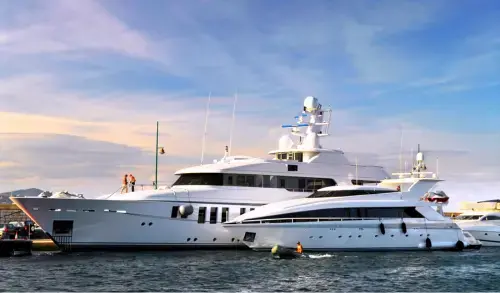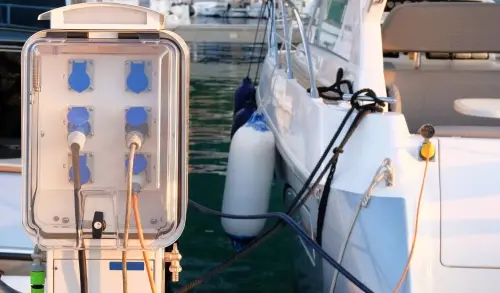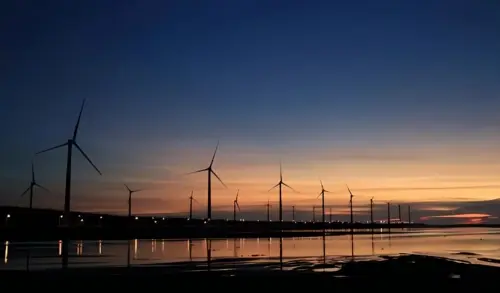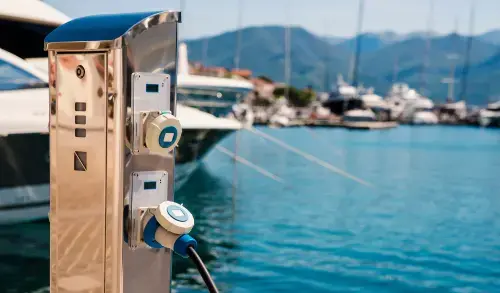Advantages of a Converter with Proportional Shore Power Cord Sharing
Today’s yachts require more electrical power than a single shore power cord can reliably deliver, especially in marinas with limited or mismatched...
5 min read
Atlas Marine Systems : Apr 23, 2025 9:30:00 AM

Marina shore power is often unpredictable. Voltage fluctuations, frequency mismatches, and electrical surges can compromise critical onboard systems—from navigation and communications to HVAC and battery charging. Left unregulated, they gradually degrade performance, increase wear on components, and lead to costly service interruptions.
When power is unreliable, so is your vessel. A shore power converter provides peace of mind for yacht owners, ensuring they can dock at any marina, connect to shore power reliably, and shut off diesel generators, regardless of local power quality. In this guide, we’ll explain why every yacht should be equipped with a shore power converter, how it protects onboard systems, and what features to look for when choosing the right one.
Even well-equipped marinas can’t guarantee clean, consistent power. From overloaded infrastructure to regional frequency differences, shore power often introduces electrical risks that your vessel’s systems weren’t designed to handle. Understanding these challenges is the first step in protecting your onboard electronics.
Marinas often supply power to multiple vessels simultaneously, stretching their electrical infrastructure to its limits. As a result, the voltage can spike or drop unpredictably, depending on the overall demand in the marina.
Additionally, marina shore power outlets may not always provide sufficient amperage for modern yacht systems. If the power amperage rating is too low, it can result in tripped breakers, underpowered systems, or forced reliance on onboard generators. These unstable conditions create several risks:
Power surges can overload sensitive onboard systems, damaging electronics, HVAC units, and navigation equipment.
Voltage drops (brownouts) occur when the supply dips too low, causing systems to underperform or fail.
Fluctuating voltage swings can produce damaging spikes that overwhelm power supply circuits inside electronic equipment, leading to premature failure.
Shore power frequency varies by region and can cause operational inefficiencies and equipment damage if improperly managed. Some issues you may encounter include:
Electrical motors, pumps, and refrigeration systems are designed for specific frequencies. Running them on an incompatible power source can lead to overheating, reduced efficiency, and eventual failure.
Automatic power management systems may not recognize or adapt to frequency variations, leading to unexpected shutdowns or malfunctions.
A vessel moving between different regions must ensure its power system is adaptable to avoid costly electrical modifications or damage.
Not all shore power is "clean." Electrical noise, transient voltage spikes, and grounding issues can create interference that affects a yacht’s most critical systems. How does this impact your vessel?
Electrical noise from other vessels, faulty wiring, or unstable grids can interfere with navigation, communication, and entertainment systems.
Power surges caused by grid switching, lightning strikes, or sudden load changes can damage sensitive electronics.
Improper grounding or stray currents from a marina’s power infrastructure can accelerate galvanic corrosion, threatening metal components.
Shore power inconsistencies create long-term risks for onboard electrical systems. A shore power converter eliminates these risks by conditioning, stabilizing, and isolating shore power before it reaches the vessel. Ensuring clean, regulated power protects electrical infrastructure and extends equipment lifespan.
Marina power rarely maintains a perfectly stable voltage output. Load demand fluctuates throughout the day, and electrical distribution can be inconsistent due to infrastructure limitations. A shore power converter:
Stabilizes incoming voltage, preventing overvoltage that can damage electrical components.
Prevents under-voltage (brownouts), ensuring systems receive adequate power for uninterrupted operation.
Reduces electrical strain, extending the lifespan of batteries, power distribution units, and onboard automation.
Ensures that even major fluctuations or noise on the marina’s grid are filtered out before reaching onboard systems.
In extreme cases, such as a brownout where voltage drops dangerously low, sometimes approaching zero, the converter actively protects onboard equipment by shutting off power output to the yacht. This prevents harmful low-voltage conditions from reaching sensitive systems. The converter constantly monitors incoming power and instantly disconnects when thresholds fall outside safe operating limits, resuming supply only when voltage stabilizes.
Shore power operates at different frequencies depending on the region; some marinas supply 50Hz, while others provide 60Hz. If a vessel’s electrical system isn’t designed for a frequency mismatch, motors, refrigeration units, and sensitive electronics may overheat, run inefficiently, or even fail.
A shore power converter:
Automatically adjusts frequency to match the vessel’s electrical requirements.
Prevents overheating and wear on motors, pumps, and refrigeration systems.
Ensures consistent performance for power-sensitive components, regardless of where the yacht is docked.
Most shore power converters are designed to accept both single-phase and three-phase power, allowing vessels to connect seamlessly at marinas with different electrical infrastructures. This universal compatibility, along with automatic voltage and frequency regulation, is made possible through a multi-stage conversion process—first converting incoming AC power to regulated DC, then isolating it through a transformer, and finally converting it back to clean, stable AC. This architecture enables the converter to deliver consistent power even under wide-ranging and unstable input conditions, ensuring yachts can dock and operate safely anywhere in the world.
Marina power grids are shared among multiple vessels, making them vulnerable to electrical noise, transient voltage spikes, and improper grounding. A shore power converter:
Filters out electrical noise, preventing interference with navigation and automation systems.
Protects against voltage spikes, shielding sensitive electronics from transient damage.
Prevents grounding issues, reducing the risk of stray current corrosion.
Advanced internal technologies make these protective features possible, including isolation transformers, rectifiers, and inverters. The isolation transformer serves a dual purpose—electrically separating the yacht from the marina power source to prevent stray current hazards while breaking galvanic paths that can corrode the vessel’s hull and fittings over time.
Without a shore power converter, vessels may need to compensate for unstable marina power by relying on onboard generators, leading to higher fuel consumption and increased maintenance demands. A shore power converter:
Delivers uninterrupted power, reducing reliance on generators.
Ensures stable electrical distribution, preventing power imbalances between onboard systems.
Optimizes energy efficiency, reducing operational costs over time.
A shore power converter removes the guesswork and inconvenience of connecting to unpredictable marina power. It ensures your onboard systems receive clean, consistent power, no matter where you dock. A shore power converter:
Eliminates power inconsistencies worldwide – Automatically adjusts voltage and frequency to match the yacht’s electrical system, preventing compatibility issues at different marinas.
Protects onboard systems from damage – Filters out unstable power, preventing electrical strain, malfunctions, and costly repairs.
Reduces reliance on generators – Lowers fuel consumption and maintenance costs by providing a stable shore power connection.
Improves operational efficiency – Ensures predictable, uninterrupted power for all onboard systems, minimizing downtime.
The key point in selecting a converter is to ensure it is correctly rated and capable of delivering all the power your yacht requires. Even the most advanced converter may fall short during peak load conditions without adequate capacity.
A high-quality converter should be designed for reliable performance in harsh marine environments, with special attention to overload handling and thermal tolerance. Units that only meet minimum ratings may place internal components under constant stress, reducing long-term reliability. Look for converters engineered to exceed those minimums—this ensures that components operate well within safe limits, even in hot and humid conditions. The result is more consistent power, fewer failures, and a longer service life for your electrical systems.
Another advanced feature to look for is a shore power converter with inputs for two shore cables. This setup allows yachts with high power demands to draw from two marina power outlets when one isn’t sufficient. Unlike dual-converter systems, a single converter with dual inputs can operate flexibly, using only one connection if the outlet provides enough capacity.
A high-quality converter will also include proportional load sharing, which intelligently distributes the power draw between the two inputs based on available amperage. For example, if the yacht is connected to a 100-amp and a 50-amp outlet, the converter would automatically allocate two-thirds of the load to the larger outlet and one-third to the smaller, making full use of all 150 amps. Without proportional sharing, the system would split the load evenly, limiting usable power and risking breaker trips on the lower-capacity outlet.
Unstable power isn’t just inconvenient—it can lead to avoidable breakdowns and downtime. Atlas Marine Systems eliminates that risk with advanced shore power converters that deliver clean, stable power at any dock, anywhere in the world.
With decades of industry leadership, Atlas Marine Systems is trusted by yacht owners and shipbuilders alike for our high-performance, globally compatible converters designed for long-term reliability in the most demanding marine environments.
Talk to our team to find the right solution for your vessel, or explore our range of products to see how Atlas Marine Systems keeps yachts powered safely, efficiently, and without compromise.

Today’s yachts require more electrical power than a single shore power cord can reliably deliver, especially in marinas with limited or mismatched...

A power conditioner powers and protects the expensive technology on your yacht and provides useful additional benefits. Below, Superyacht Technology...

Modern yachts are more power-hungry than ever before. High-capacity HVAC systems, advanced navigation electronics, stabilized platforms, and hotel...